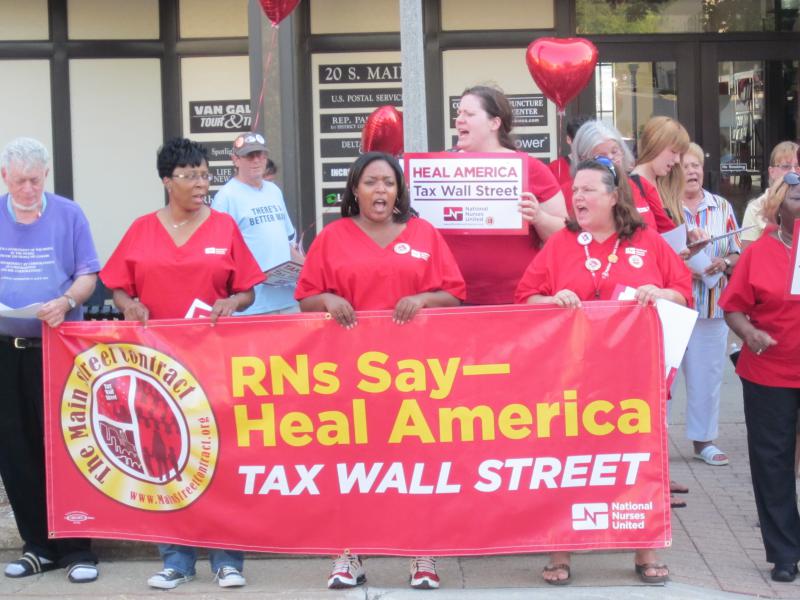Submitted by Mary Bottari on
 As President Obama gets ready for his big jobs speech Thursday, America's nurses have a message for him. "Heal America, Tax Wall Street!" the signs read as nurses rallied in front of 61 Congressional offices this week. The nurses are proposing a bold alternative to the "cut, cut, cut" rhetoric emanating from Washington, D.C.
As President Obama gets ready for his big jobs speech Thursday, America's nurses have a message for him. "Heal America, Tax Wall Street!" the signs read as nurses rallied in front of 61 Congressional offices this week. The nurses are proposing a bold alternative to the "cut, cut, cut" rhetoric emanating from Washington, D.C.
Their proposal? "It's time for the Wall Street financiers who created this crisis and continue to hold much of the nation's wealth to start contributing to rebuild this country and for the American people to regain their future," explained Rosanne DeMoro, Executive Director of National Nurses Union (NNU), in a press release. The nurses are joining groups across the nation and around the world who are calling for a financial transaction fee on high-volume, high-speed Wall Street trades, to tamp down dangerous speculation and to raise revenue for heath care, jobs and other critical needs.
CEO Compensation Outstrips the Company's Tax Bill

Worse, at 25 of these firms, CEO compensation was greater than the company's entire federal corporate income tax bill. Prudential CEO John Strangfeld made $16.2 million in 2010, but his entire company got a $722 million refund from the federal government. Bank of New York Mellon CEO Robert Kelly took home $19.4 million in 2010. The bank, the same year, claimed a $670 million federal tax refund, despite $2.4 billion in U.S. pre-tax income.
"Where's the shared sacrifice?" asked the nurse who cited the study in front of Wisconsin Representative Paul Ryan's Janesville office.
Paul Ryan's Main Street

Janesville, Wisconsin is a stark illustration of the problem the nurses were addressing. The 2008 Wall Street economic crisis killed the last big employer in Janesville, shuttering a General Motors plant for SUVs that employed 2,400 workers. Wages at the GM plant were in the range of $28 an hour.
Unemployment in the surrounding county is 9.5 percent and over 69,000 people in Ryan's district are uninsured. Hundreds of the stores on Janesville's Main Street stand empty, while the little mall where Ryan's office is located houses Manpower Inc., the temp working service that peddles low-wage, dead end jobs to former GM workers.
Ryan's plan to fix the economy? The chair of the House Budget Committee has proposed a radical "Roadmap for America" that cuts taxes for the wealthiest and corporations, privatizes Social Security, Medicare, Medicaid and the Children's Health Insurance plan, and repeals Wall Street reform to facilitate the next crash.
These policy prescriptions are sheer madness to the folks rallying in downtown Janesville. "What Ryan is doing will destroy Medicare and put people on the streets," said Janesville resident and firefighter Joe Conway. "It's time to stand up to the Paul Ryan's of the world."
Tax Wall Street Speculation
The nurses were asking Ryan to support a Wall Street financial transaction tax. A tiny tax on the sale of stocks, futures and options that has the potential to raise billions in revenue, while tamping down on large-volume noise trading and speculation. Such a bill is being planned by Oregon Congressman Pete DeFazio and Iowa Senator Tom Harkin, who paired up two years ago to "put Wall Street to work for Main Street" and tax Wall Street to fund a jobs program.
Canary Warf, London's Wall Street, has been taxing these trades for decades, and recently the European Union voted to support a transaction tax. France's Sarkozy and Germany's Angela Merkel are both on board. Now its time for Obama to step up and give meaning to his talk of "shared sacrifice."
On September 8th, we will see if Obama really thinks we have a jobs crisis, or if he hopes to coast to victory. If he continues to talk about the job-creating potential of insane trade deals, like those proposed with Korea and Panama, we are doomed. If, however, he launches a campaign for a major new infrastructure bank funded by a Wall Street tax, then he is headed in the right direction, putting forward needed and popular proposals that make America stronger.
"This is a time for boldness. And this is a moment that working people will judge all our leaders. Will they propose solutions that are on the scale necessary to address the job crisis that America has right now?" said Richard Trumka, president of the 12-million-member AFL-CIO.
America's 30 million unemployed and underemployed, who can't make ends meet, will be watching.


Comments
jletennier replied on Permalink
Tax the Rich